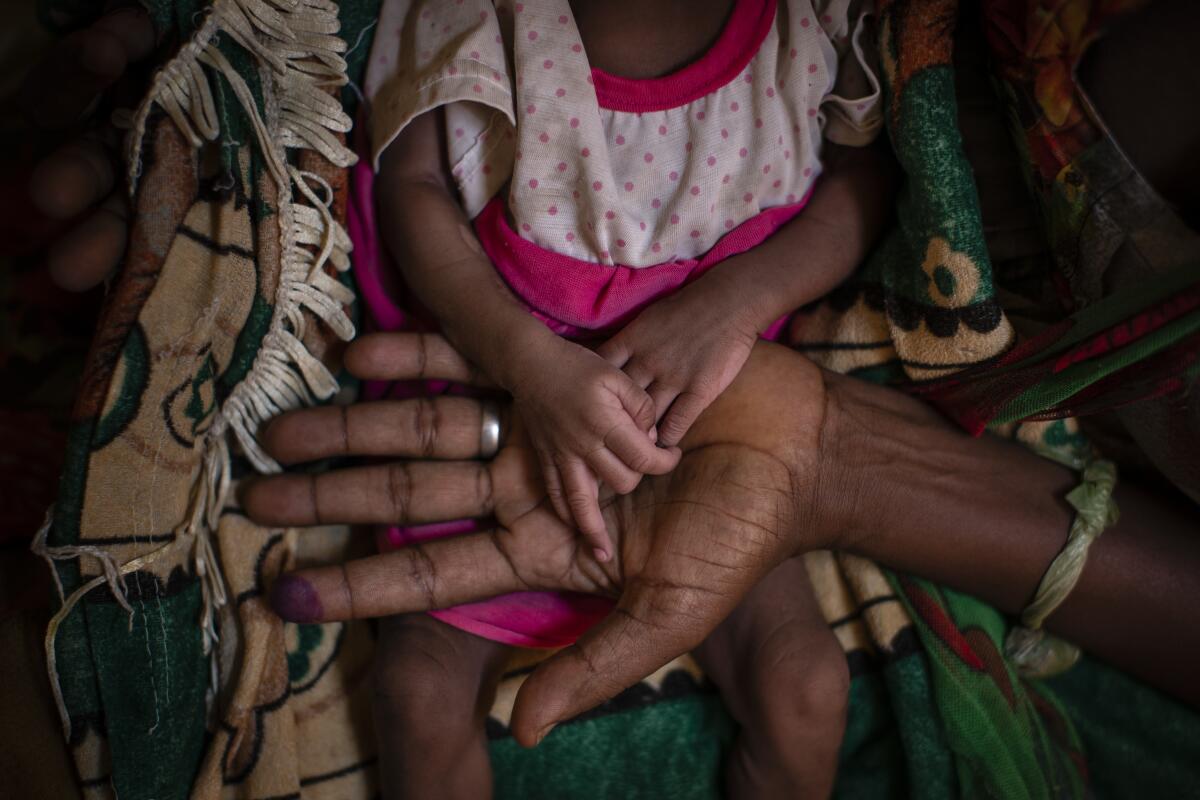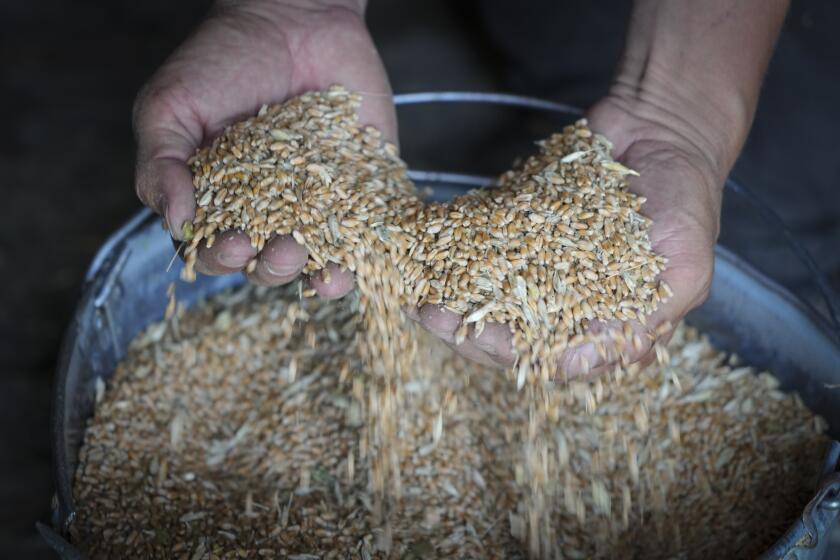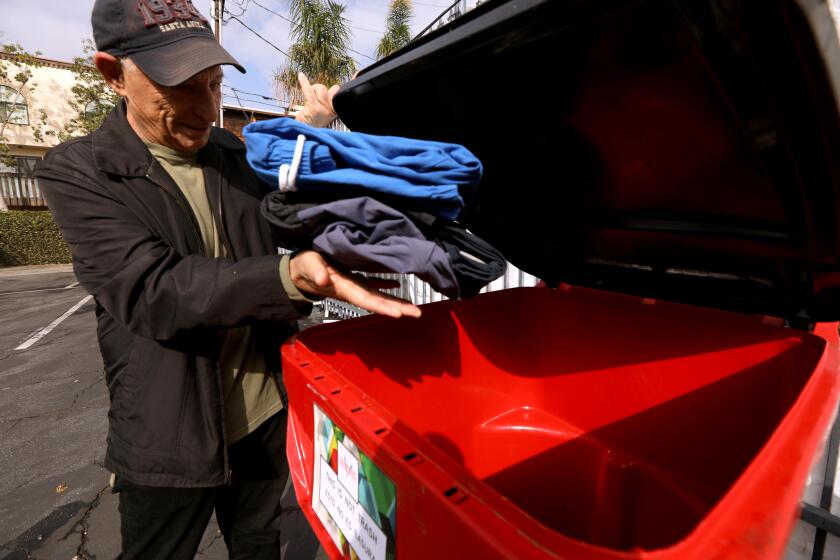Op-Ed: Don’t be a bystander. What you can do to help get aid to the millions at risk of famine

- Share via
Last month, in the middle of the day on a busy street in the Italian town of Civitanova Marche, Alika Ogorchukwu, a Nigerian street vendor, was attacked and killed by a man using his bare hands. Although the police were called, and someone filmed the attack, no one intervened. Amid general outrage, an editorial in the Italian newspaper La Stampa took this as a sign that we are in “the twilight of civilization.” As psychology experiments have shown, an individual is less likely to come to the aid of another if they can see that other people who could help are not doing so.
If you had been there, would you have aided Ogorchukwu? Consider, before you answer, that to intervene would have involved some personal risk. The assailant was not using a weapon, but how could you know that he did not have one? And even without a weapon, he was evidently both enraged and strong.
Whatever you feel you would have done had you been present, a far bigger bystander effect is playing out right now. In this case, you can assist in saving the lives of others, without any danger to you. Moreover, some of those whom you may be able to save are Nigerians, which makes it possible to think of the assistance as a token of your opposition to the failure to help Ogorchukwu.
A report issued recently by the United Nations Food and Agriculture Organization and the World Food Program warns that between now and September, famine could affect 49 million people in 46 countries. The countries most at risk are Afghanistan, Ethiopia, Nigeria, Somalia, South Sudan and Yemen. Civil strife is one major risk factor for famine in these countries, but the report also cites weather extremes, such as storms, flooding and drought, and rising food and energy prices stemming from the war in Ukraine.
Russia’s invasion of Ukraine has upended the operations of what was the world’s fourth-largest grain exporter, with global consequences.
And yet a disturbing trend has become evident: Governments of affluent countries are giving less foreign aid. The most striking example is the United Kingdom, a country that gradually, with bipartisan agreement, worked its way up to the United Nations foreign-aid target of 0.7% of gross national income. That target was reached in 2013 and was met every year until 2020. In 2021, however, the U.K.’s foreign-aid budget was slashed to 0.5% of GNI, and it will most likely remain at that level in 2022.
As Mark Lowcock, a former permanent secretary of the U.K. Department for International Development, pointed out in a recent interview, his country, which used to be a world leader in making extreme poverty the clear priority of its aid program, is now placing less emphasis on helping the poorest and weakest countries.
Aid to countries like Yemen, South Sudan and Somalia has been cut, increasing the loss of life from humanitarian disasters. Instead, Lowcock says, aid is going to middle-income countries where its impact on people’s lives is not nearly as big as when it goes to those living below the World Bank’s extreme poverty line of $1.90 per day.
There are two important ways in which you can avoid being a bystander to the avoidable deaths of millions of people in the coming months.
First, according to preliminary figures from the Organization for Economic Co-operation and Development, in 2021, only Luxembourg, Norway, Sweden, Germany and Denmark have reached or exceeded the 0.7%-of-GNI target for foreign aid. The United States still lags near the bottom of the table of donor countries, giving only 0.18% of its GNI, while Australia, at 0.22%, is not much better.
The Volunteer Collective, an L.A.-based nonprofit, helps people help others, one manageable opportunity at a time.
If you live in an affluent country that is not meeting the 0.7% target, contact your elected representatives and tell them that you are ashamed of your country’s failure to do its share to create a world in which everyone can meet their basic needs. Join with others to create a movement for more and better foreign aid.
Second, after you have done that, don’t just sit around waiting for your government to do the right thing. Do it yourself. If you are affluent enough to go to a café and order a cup of coffee there, you are probably spending more doing that than nearly one in 10 people on this planet have to live on for an entire day.
If you don’t know how to get the best value for what you are able to give, help is available online at sites such as GiveWell or The Life You Can Save (which I founded), where you can select charities that have been independently assessed as being highly effective and offering excellent value. You don’t have to be a bystander.
Peter Singer is a professor of bioethics at Princeton University and founder of the nonprofit organization The Life You Can Save. His books include “Ethics in the Real World” and “Practical Ethics.”
More to Read
A cure for the common opinion
Get thought-provoking perspectives with our weekly newsletter.
You may occasionally receive promotional content from the Los Angeles Times.












